Reflective Practice Analysis: Healthcare Professional Module Report
VerifiedAdded on 2023/01/12
|12
|3417
|46
Report
AI Summary
This report delves into the critical role of reflective practice in healthcare, examining two prominent reflective models: Kolb's learning cycle and Gibbs reflective cycle, and explaining their significance in fostering professional development. The report presents a critical incident analysis based on a group presentation experience, applying Kolb's reflective cycle to understand and address a conflict related to presentation design. The analysis explores the stages of concrete experience, reflective observation, abstract conceptualization, and active experimentation, highlighting the student's learning journey and the development of strategies to improve teamwork and presentation skills. Additionally, the report develops an understanding of reflective practice by discussing Gibbs' Reflective Cycle, providing a detailed description of the incident, the feelings involved, an evaluation of the experience, an analysis of the incident, an action plan, and a conclusion. The report aims to enhance understanding of reflective practice and its role in healthcare. Access this and other healthcare resources on Desklib.
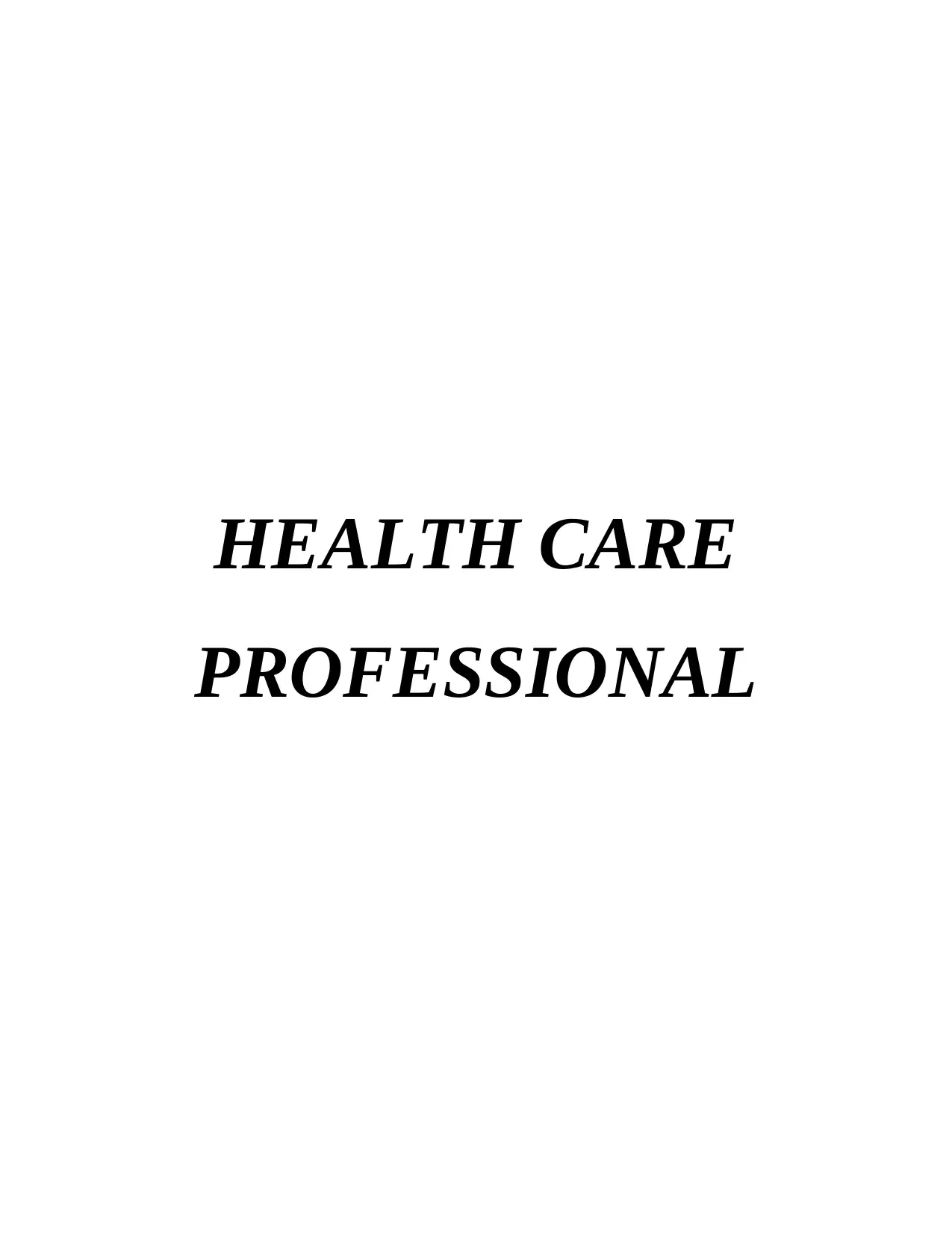
HEALTH CARE
PROFESSIONAL
PROFESSIONAL
Paraphrase This Document
Need a fresh take? Get an instant paraphrase of this document with our AI Paraphraser
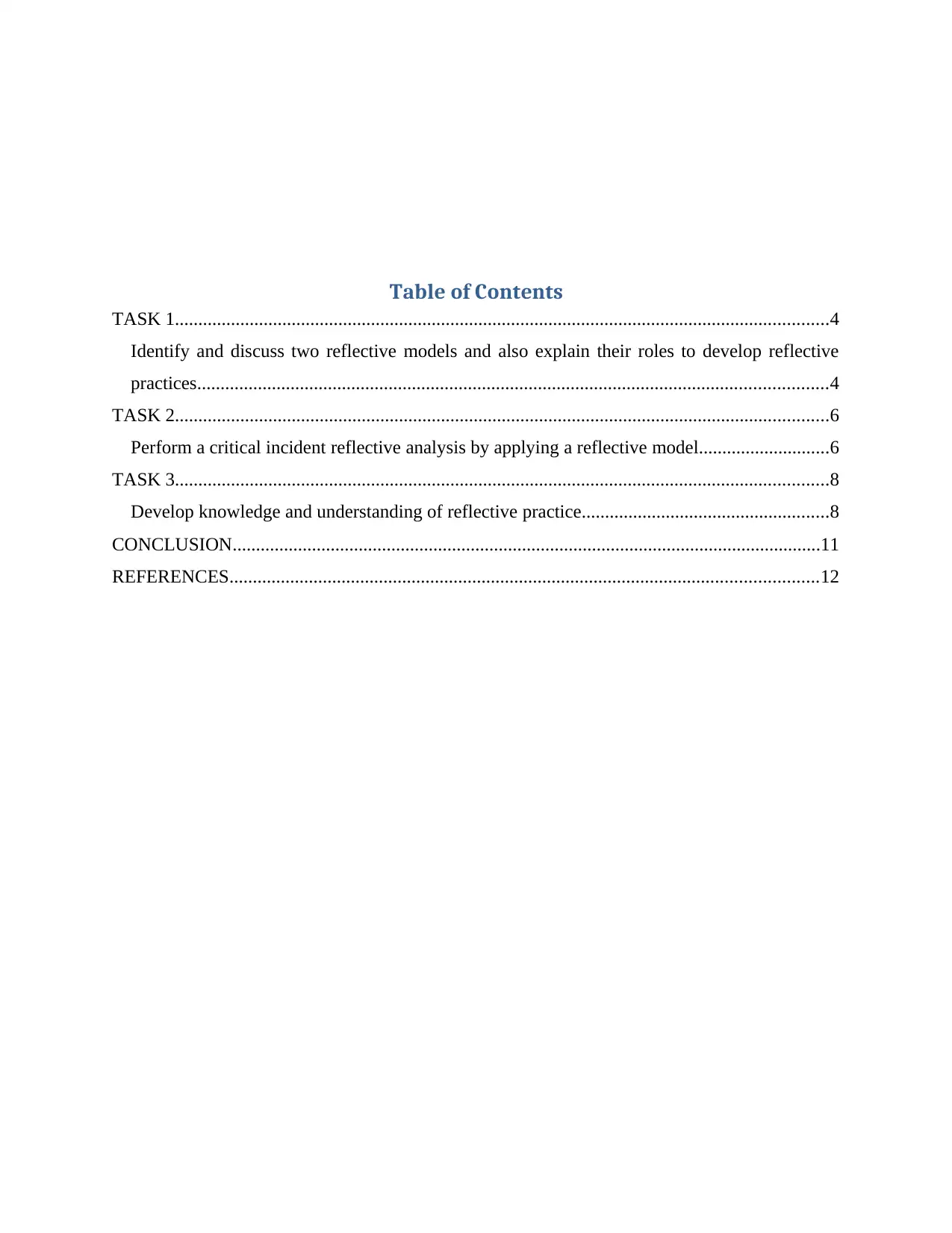
Table of Contents
TASK 1............................................................................................................................................4
Identify and discuss two reflective models and also explain their roles to develop reflective
practices.......................................................................................................................................4
TASK 2............................................................................................................................................6
Perform a critical incident reflective analysis by applying a reflective model............................6
TASK 3............................................................................................................................................8
Develop knowledge and understanding of reflective practice.....................................................8
CONCLUSION..............................................................................................................................11
REFERENCES..............................................................................................................................12
TASK 1............................................................................................................................................4
Identify and discuss two reflective models and also explain their roles to develop reflective
practices.......................................................................................................................................4
TASK 2............................................................................................................................................6
Perform a critical incident reflective analysis by applying a reflective model............................6
TASK 3............................................................................................................................................8
Develop knowledge and understanding of reflective practice.....................................................8
CONCLUSION..............................................................................................................................11
REFERENCES..............................................................................................................................12

⊘ This is a preview!⊘
Do you want full access?
Subscribe today to unlock all pages.

Trusted by 1+ million students worldwide
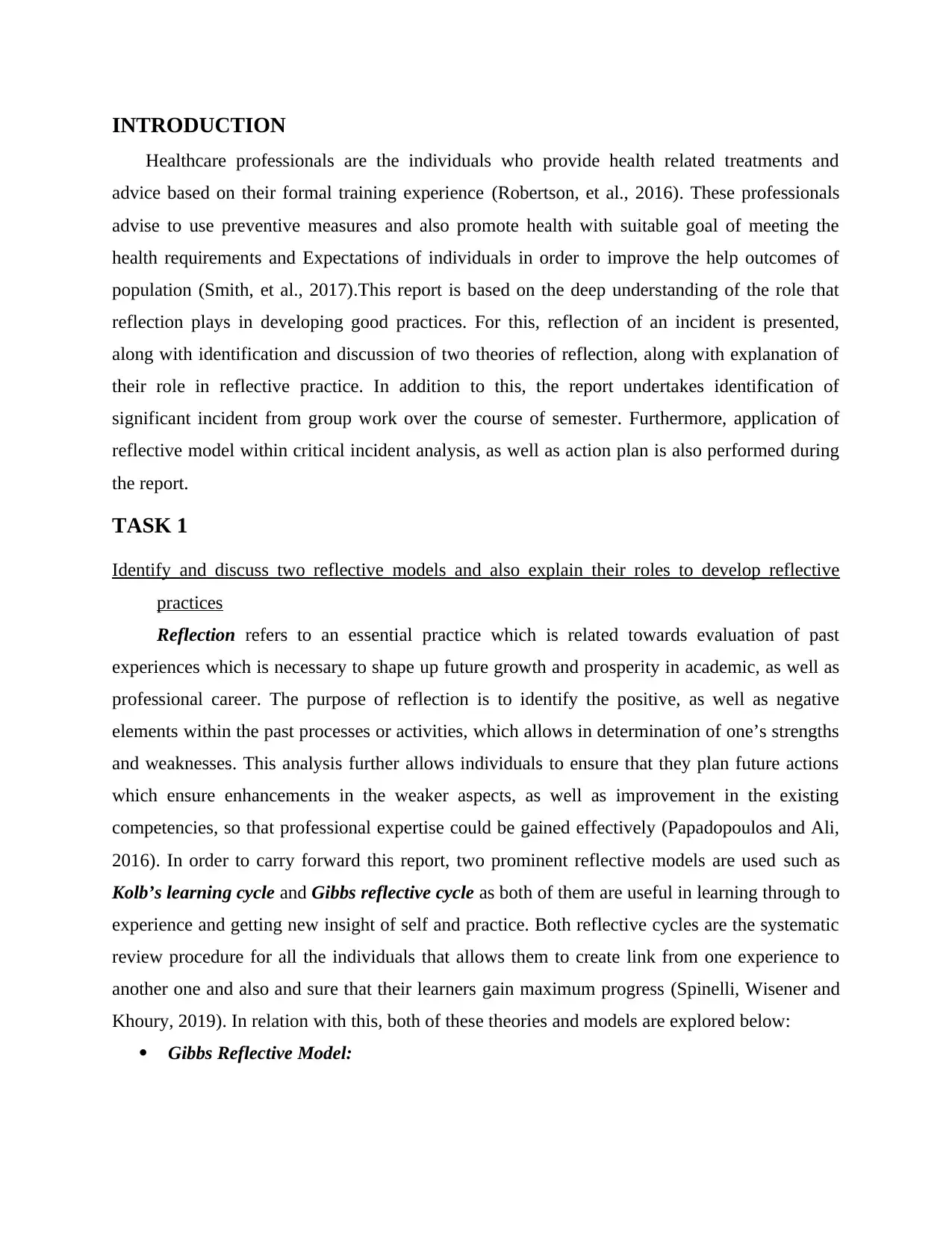
INTRODUCTION
Healthcare professionals are the individuals who provide health related treatments and
advice based on their formal training experience (Robertson, et al., 2016). These professionals
advise to use preventive measures and also promote health with suitable goal of meeting the
health requirements and Expectations of individuals in order to improve the help outcomes of
population (Smith, et al., 2017).This report is based on the deep understanding of the role that
reflection plays in developing good practices. For this, reflection of an incident is presented,
along with identification and discussion of two theories of reflection, along with explanation of
their role in reflective practice. In addition to this, the report undertakes identification of
significant incident from group work over the course of semester. Furthermore, application of
reflective model within critical incident analysis, as well as action plan is also performed during
the report.
TASK 1
Identify and discuss two reflective models and also explain their roles to develop reflective
practices
Reflection refers to an essential practice which is related towards evaluation of past
experiences which is necessary to shape up future growth and prosperity in academic, as well as
professional career. The purpose of reflection is to identify the positive, as well as negative
elements within the past processes or activities, which allows in determination of one’s strengths
and weaknesses. This analysis further allows individuals to ensure that they plan future actions
which ensure enhancements in the weaker aspects, as well as improvement in the existing
competencies, so that professional expertise could be gained effectively (Papadopoulos and Ali,
2016). In order to carry forward this report, two prominent reflective models are used such as
Kolb’s learning cycle and Gibbs reflective cycle as both of them are useful in learning through to
experience and getting new insight of self and practice. Both reflective cycles are the systematic
review procedure for all the individuals that allows them to create link from one experience to
another one and also and sure that their learners gain maximum progress (Spinelli, Wisener and
Khoury, 2019). In relation with this, both of these theories and models are explored below:
Gibbs Reflective Model:
Healthcare professionals are the individuals who provide health related treatments and
advice based on their formal training experience (Robertson, et al., 2016). These professionals
advise to use preventive measures and also promote health with suitable goal of meeting the
health requirements and Expectations of individuals in order to improve the help outcomes of
population (Smith, et al., 2017).This report is based on the deep understanding of the role that
reflection plays in developing good practices. For this, reflection of an incident is presented,
along with identification and discussion of two theories of reflection, along with explanation of
their role in reflective practice. In addition to this, the report undertakes identification of
significant incident from group work over the course of semester. Furthermore, application of
reflective model within critical incident analysis, as well as action plan is also performed during
the report.
TASK 1
Identify and discuss two reflective models and also explain their roles to develop reflective
practices
Reflection refers to an essential practice which is related towards evaluation of past
experiences which is necessary to shape up future growth and prosperity in academic, as well as
professional career. The purpose of reflection is to identify the positive, as well as negative
elements within the past processes or activities, which allows in determination of one’s strengths
and weaknesses. This analysis further allows individuals to ensure that they plan future actions
which ensure enhancements in the weaker aspects, as well as improvement in the existing
competencies, so that professional expertise could be gained effectively (Papadopoulos and Ali,
2016). In order to carry forward this report, two prominent reflective models are used such as
Kolb’s learning cycle and Gibbs reflective cycle as both of them are useful in learning through to
experience and getting new insight of self and practice. Both reflective cycles are the systematic
review procedure for all the individuals that allows them to create link from one experience to
another one and also and sure that their learners gain maximum progress (Spinelli, Wisener and
Khoury, 2019). In relation with this, both of these theories and models are explored below:
Gibbs Reflective Model:
Paraphrase This Document
Need a fresh take? Get an instant paraphrase of this document with our AI Paraphraser
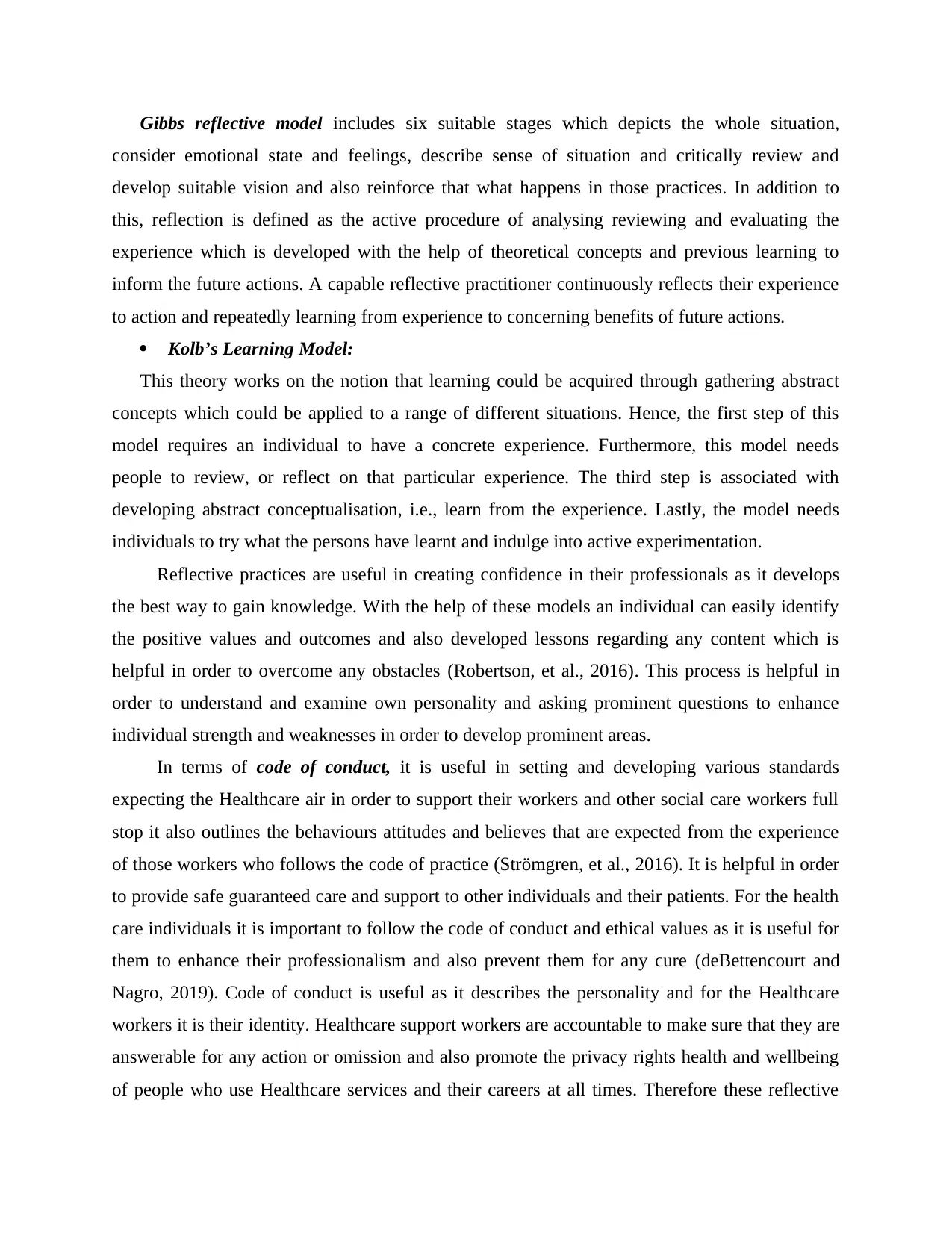
Gibbs reflective model includes six suitable stages which depicts the whole situation,
consider emotional state and feelings, describe sense of situation and critically review and
develop suitable vision and also reinforce that what happens in those practices. In addition to
this, reflection is defined as the active procedure of analysing reviewing and evaluating the
experience which is developed with the help of theoretical concepts and previous learning to
inform the future actions. A capable reflective practitioner continuously reflects their experience
to action and repeatedly learning from experience to concerning benefits of future actions.
Kolb’s Learning Model:
This theory works on the notion that learning could be acquired through gathering abstract
concepts which could be applied to a range of different situations. Hence, the first step of this
model requires an individual to have a concrete experience. Furthermore, this model needs
people to review, or reflect on that particular experience. The third step is associated with
developing abstract conceptualisation, i.e., learn from the experience. Lastly, the model needs
individuals to try what the persons have learnt and indulge into active experimentation.
Reflective practices are useful in creating confidence in their professionals as it develops
the best way to gain knowledge. With the help of these models an individual can easily identify
the positive values and outcomes and also developed lessons regarding any content which is
helpful in order to overcome any obstacles (Robertson, et al., 2016). This process is helpful in
order to understand and examine own personality and asking prominent questions to enhance
individual strength and weaknesses in order to develop prominent areas.
In terms of code of conduct, it is useful in setting and developing various standards
expecting the Healthcare air in order to support their workers and other social care workers full
stop it also outlines the behaviours attitudes and believes that are expected from the experience
of those workers who follows the code of practice (Strömgren, et al., 2016). It is helpful in order
to provide safe guaranteed care and support to other individuals and their patients. For the health
care individuals it is important to follow the code of conduct and ethical values as it is useful for
them to enhance their professionalism and also prevent them for any cure (deBettencourt and
Nagro, 2019). Code of conduct is useful as it describes the personality and for the Healthcare
workers it is their identity. Healthcare support workers are accountable to make sure that they are
answerable for any action or omission and also promote the privacy rights health and wellbeing
of people who use Healthcare services and their careers at all times. Therefore these reflective
consider emotional state and feelings, describe sense of situation and critically review and
develop suitable vision and also reinforce that what happens in those practices. In addition to
this, reflection is defined as the active procedure of analysing reviewing and evaluating the
experience which is developed with the help of theoretical concepts and previous learning to
inform the future actions. A capable reflective practitioner continuously reflects their experience
to action and repeatedly learning from experience to concerning benefits of future actions.
Kolb’s Learning Model:
This theory works on the notion that learning could be acquired through gathering abstract
concepts which could be applied to a range of different situations. Hence, the first step of this
model requires an individual to have a concrete experience. Furthermore, this model needs
people to review, or reflect on that particular experience. The third step is associated with
developing abstract conceptualisation, i.e., learn from the experience. Lastly, the model needs
individuals to try what the persons have learnt and indulge into active experimentation.
Reflective practices are useful in creating confidence in their professionals as it develops
the best way to gain knowledge. With the help of these models an individual can easily identify
the positive values and outcomes and also developed lessons regarding any content which is
helpful in order to overcome any obstacles (Robertson, et al., 2016). This process is helpful in
order to understand and examine own personality and asking prominent questions to enhance
individual strength and weaknesses in order to develop prominent areas.
In terms of code of conduct, it is useful in setting and developing various standards
expecting the Healthcare air in order to support their workers and other social care workers full
stop it also outlines the behaviours attitudes and believes that are expected from the experience
of those workers who follows the code of practice (Strömgren, et al., 2016). It is helpful in order
to provide safe guaranteed care and support to other individuals and their patients. For the health
care individuals it is important to follow the code of conduct and ethical values as it is useful for
them to enhance their professionalism and also prevent them for any cure (deBettencourt and
Nagro, 2019). Code of conduct is useful as it describes the personality and for the Healthcare
workers it is their identity. Healthcare support workers are accountable to make sure that they are
answerable for any action or omission and also promote the privacy rights health and wellbeing
of people who use Healthcare services and their careers at all times. Therefore these reflective
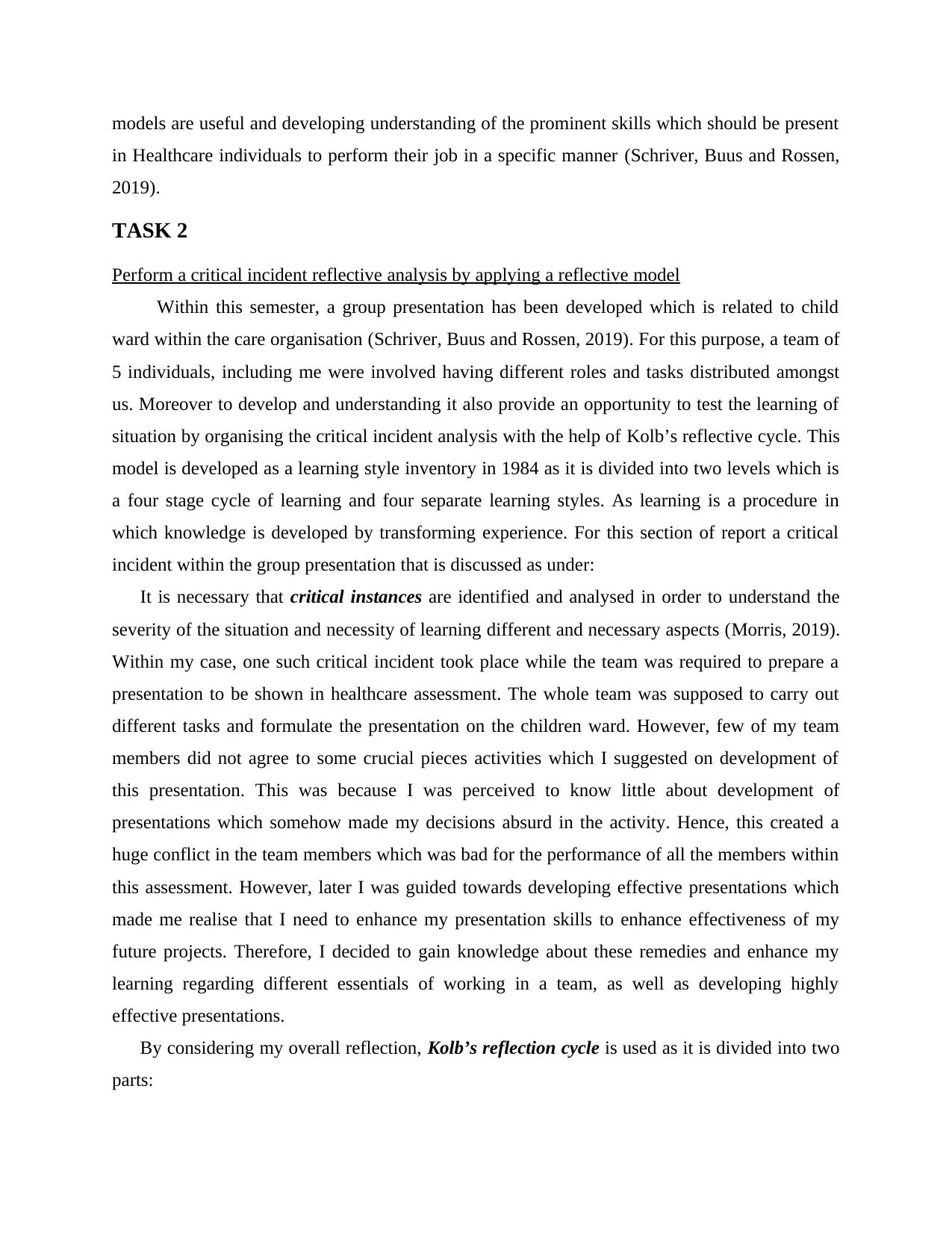
models are useful and developing understanding of the prominent skills which should be present
in Healthcare individuals to perform their job in a specific manner (Schriver, Buus and Rossen,
2019).
TASK 2
Perform a critical incident reflective analysis by applying a reflective model
Within this semester, a group presentation has been developed which is related to child
ward within the care organisation (Schriver, Buus and Rossen, 2019). For this purpose, a team of
5 individuals, including me were involved having different roles and tasks distributed amongst
us. Moreover to develop and understanding it also provide an opportunity to test the learning of
situation by organising the critical incident analysis with the help of Kolb’s reflective cycle. This
model is developed as a learning style inventory in 1984 as it is divided into two levels which is
a four stage cycle of learning and four separate learning styles. As learning is a procedure in
which knowledge is developed by transforming experience. For this section of report a critical
incident within the group presentation that is discussed as under:
It is necessary that critical instances are identified and analysed in order to understand the
severity of the situation and necessity of learning different and necessary aspects (Morris, 2019).
Within my case, one such critical incident took place while the team was required to prepare a
presentation to be shown in healthcare assessment. The whole team was supposed to carry out
different tasks and formulate the presentation on the children ward. However, few of my team
members did not agree to some crucial pieces activities which I suggested on development of
this presentation. This was because I was perceived to know little about development of
presentations which somehow made my decisions absurd in the activity. Hence, this created a
huge conflict in the team members which was bad for the performance of all the members within
this assessment. However, later I was guided towards developing effective presentations which
made me realise that I need to enhance my presentation skills to enhance effectiveness of my
future projects. Therefore, I decided to gain knowledge about these remedies and enhance my
learning regarding different essentials of working in a team, as well as developing highly
effective presentations.
By considering my overall reflection, Kolb’s reflection cycle is used as it is divided into two
parts:
in Healthcare individuals to perform their job in a specific manner (Schriver, Buus and Rossen,
2019).
TASK 2
Perform a critical incident reflective analysis by applying a reflective model
Within this semester, a group presentation has been developed which is related to child
ward within the care organisation (Schriver, Buus and Rossen, 2019). For this purpose, a team of
5 individuals, including me were involved having different roles and tasks distributed amongst
us. Moreover to develop and understanding it also provide an opportunity to test the learning of
situation by organising the critical incident analysis with the help of Kolb’s reflective cycle. This
model is developed as a learning style inventory in 1984 as it is divided into two levels which is
a four stage cycle of learning and four separate learning styles. As learning is a procedure in
which knowledge is developed by transforming experience. For this section of report a critical
incident within the group presentation that is discussed as under:
It is necessary that critical instances are identified and analysed in order to understand the
severity of the situation and necessity of learning different and necessary aspects (Morris, 2019).
Within my case, one such critical incident took place while the team was required to prepare a
presentation to be shown in healthcare assessment. The whole team was supposed to carry out
different tasks and formulate the presentation on the children ward. However, few of my team
members did not agree to some crucial pieces activities which I suggested on development of
this presentation. This was because I was perceived to know little about development of
presentations which somehow made my decisions absurd in the activity. Hence, this created a
huge conflict in the team members which was bad for the performance of all the members within
this assessment. However, later I was guided towards developing effective presentations which
made me realise that I need to enhance my presentation skills to enhance effectiveness of my
future projects. Therefore, I decided to gain knowledge about these remedies and enhance my
learning regarding different essentials of working in a team, as well as developing highly
effective presentations.
By considering my overall reflection, Kolb’s reflection cycle is used as it is divided into two
parts:
⊘ This is a preview!⊘
Do you want full access?
Subscribe today to unlock all pages.

Trusted by 1+ million students worldwide
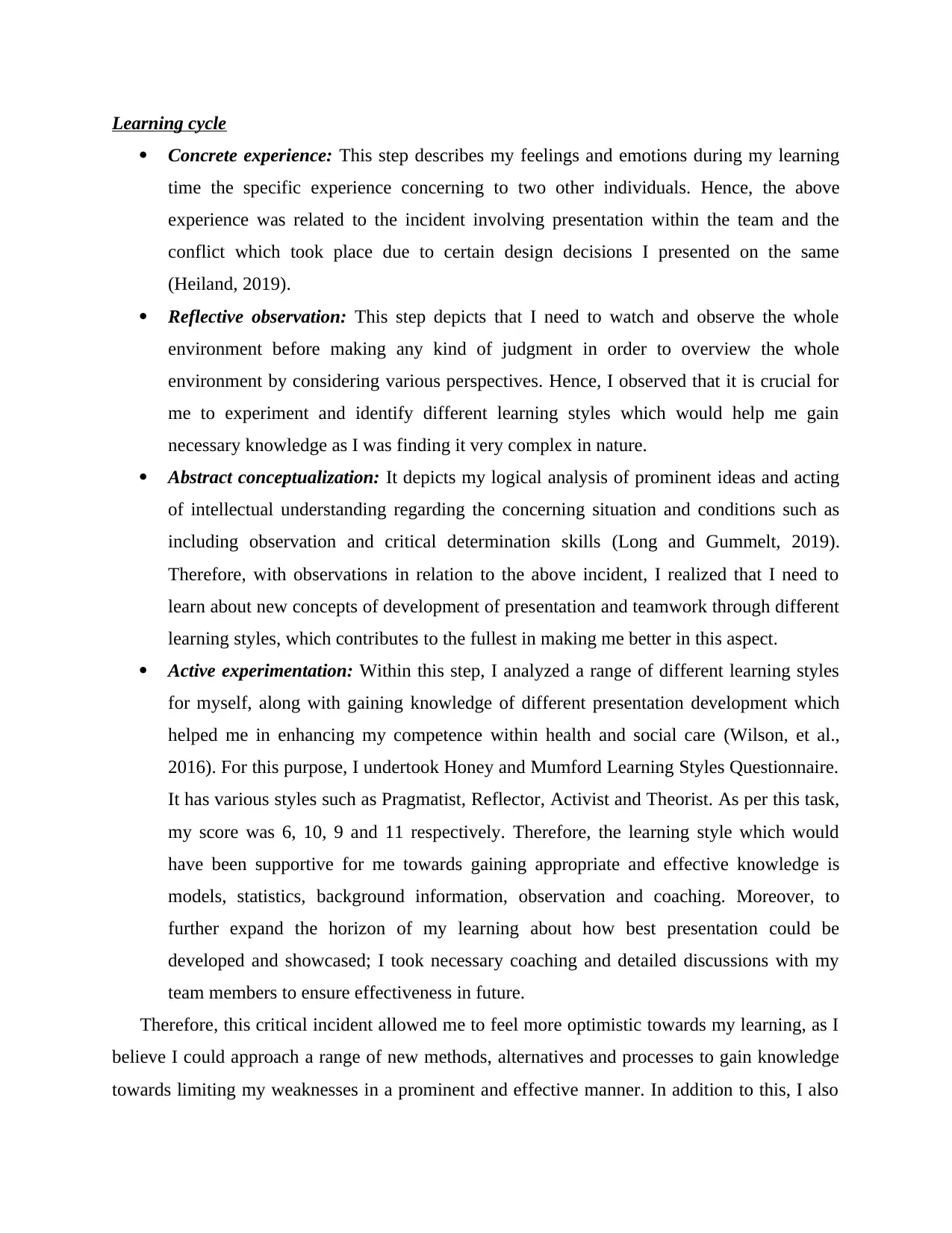
Learning cycle
Concrete experience: This step describes my feelings and emotions during my learning
time the specific experience concerning to two other individuals. Hence, the above
experience was related to the incident involving presentation within the team and the
conflict which took place due to certain design decisions I presented on the same
(Heiland, 2019).
Reflective observation: This step depicts that I need to watch and observe the whole
environment before making any kind of judgment in order to overview the whole
environment by considering various perspectives. Hence, I observed that it is crucial for
me to experiment and identify different learning styles which would help me gain
necessary knowledge as I was finding it very complex in nature.
Abstract conceptualization: It depicts my logical analysis of prominent ideas and acting
of intellectual understanding regarding the concerning situation and conditions such as
including observation and critical determination skills (Long and Gummelt, 2019).
Therefore, with observations in relation to the above incident, I realized that I need to
learn about new concepts of development of presentation and teamwork through different
learning styles, which contributes to the fullest in making me better in this aspect.
Active experimentation: Within this step, I analyzed a range of different learning styles
for myself, along with gaining knowledge of different presentation development which
helped me in enhancing my competence within health and social care (Wilson, et al.,
2016). For this purpose, I undertook Honey and Mumford Learning Styles Questionnaire.
It has various styles such as Pragmatist, Reflector, Activist and Theorist. As per this task,
my score was 6, 10, 9 and 11 respectively. Therefore, the learning style which would
have been supportive for me towards gaining appropriate and effective knowledge is
models, statistics, background information, observation and coaching. Moreover, to
further expand the horizon of my learning about how best presentation could be
developed and showcased; I took necessary coaching and detailed discussions with my
team members to ensure effectiveness in future.
Therefore, this critical incident allowed me to feel more optimistic towards my learning, as I
believe I could approach a range of new methods, alternatives and processes to gain knowledge
towards limiting my weaknesses in a prominent and effective manner. In addition to this, I also
Concrete experience: This step describes my feelings and emotions during my learning
time the specific experience concerning to two other individuals. Hence, the above
experience was related to the incident involving presentation within the team and the
conflict which took place due to certain design decisions I presented on the same
(Heiland, 2019).
Reflective observation: This step depicts that I need to watch and observe the whole
environment before making any kind of judgment in order to overview the whole
environment by considering various perspectives. Hence, I observed that it is crucial for
me to experiment and identify different learning styles which would help me gain
necessary knowledge as I was finding it very complex in nature.
Abstract conceptualization: It depicts my logical analysis of prominent ideas and acting
of intellectual understanding regarding the concerning situation and conditions such as
including observation and critical determination skills (Long and Gummelt, 2019).
Therefore, with observations in relation to the above incident, I realized that I need to
learn about new concepts of development of presentation and teamwork through different
learning styles, which contributes to the fullest in making me better in this aspect.
Active experimentation: Within this step, I analyzed a range of different learning styles
for myself, along with gaining knowledge of different presentation development which
helped me in enhancing my competence within health and social care (Wilson, et al.,
2016). For this purpose, I undertook Honey and Mumford Learning Styles Questionnaire.
It has various styles such as Pragmatist, Reflector, Activist and Theorist. As per this task,
my score was 6, 10, 9 and 11 respectively. Therefore, the learning style which would
have been supportive for me towards gaining appropriate and effective knowledge is
models, statistics, background information, observation and coaching. Moreover, to
further expand the horizon of my learning about how best presentation could be
developed and showcased; I took necessary coaching and detailed discussions with my
team members to ensure effectiveness in future.
Therefore, this critical incident allowed me to feel more optimistic towards my learning, as I
believe I could approach a range of new methods, alternatives and processes to gain knowledge
towards limiting my weaknesses in a prominent and effective manner. In addition to this, I also
Paraphrase This Document
Need a fresh take? Get an instant paraphrase of this document with our AI Paraphraser
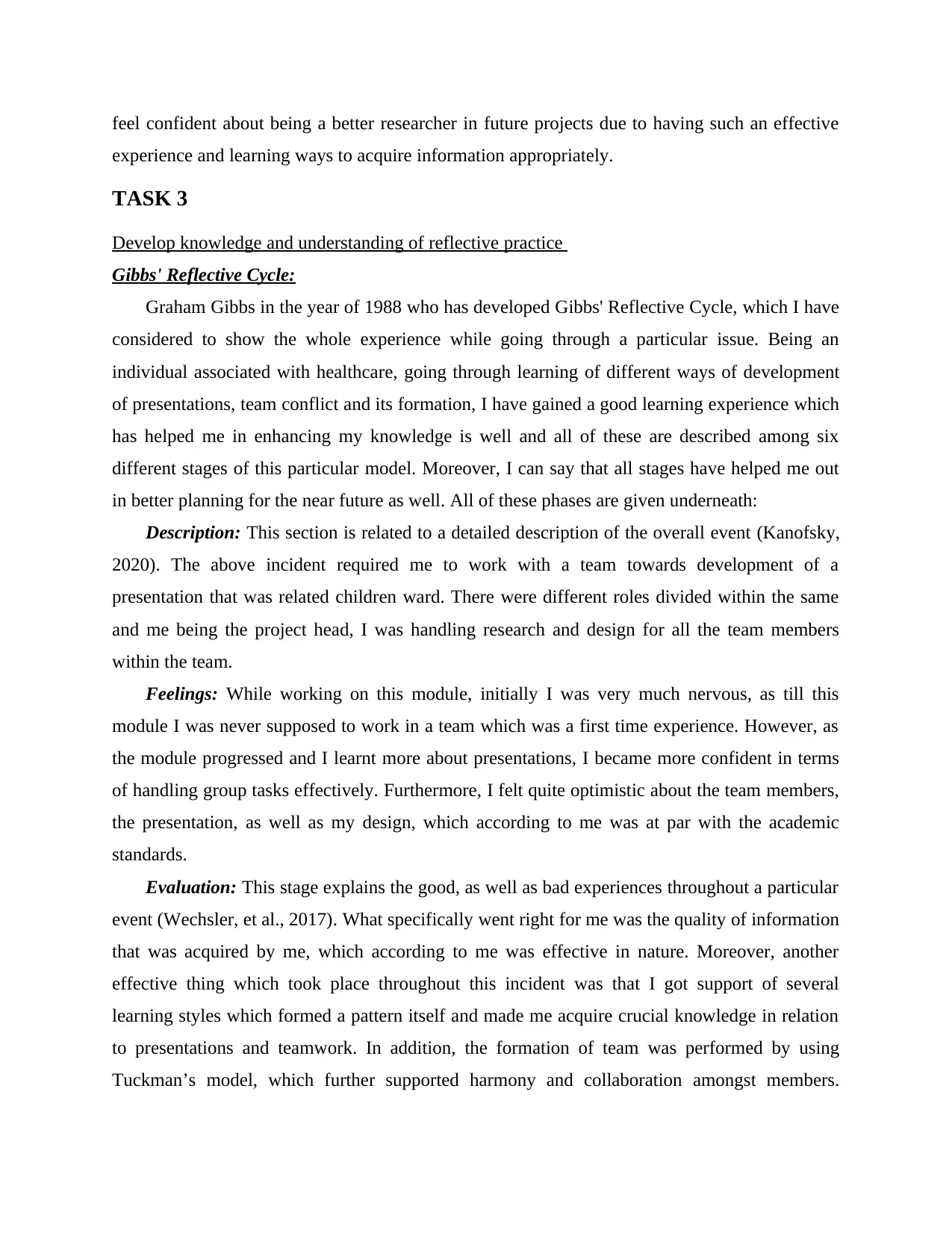
feel confident about being a better researcher in future projects due to having such an effective
experience and learning ways to acquire information appropriately.
TASK 3
Develop knowledge and understanding of reflective practice
Gibbs' Reflective Cycle:
Graham Gibbs in the year of 1988 who has developed Gibbs' Reflective Cycle, which I have
considered to show the whole experience while going through a particular issue. Being an
individual associated with healthcare, going through learning of different ways of development
of presentations, team conflict and its formation, I have gained a good learning experience which
has helped me in enhancing my knowledge is well and all of these are described among six
different stages of this particular model. Moreover, I can say that all stages have helped me out
in better planning for the near future as well. All of these phases are given underneath:
Description: This section is related to a detailed description of the overall event (Kanofsky,
2020). The above incident required me to work with a team towards development of a
presentation that was related children ward. There were different roles divided within the same
and me being the project head, I was handling research and design for all the team members
within the team.
Feelings: While working on this module, initially I was very much nervous, as till this
module I was never supposed to work in a team which was a first time experience. However, as
the module progressed and I learnt more about presentations, I became more confident in terms
of handling group tasks effectively. Furthermore, I felt quite optimistic about the team members,
the presentation, as well as my design, which according to me was at par with the academic
standards.
Evaluation: This stage explains the good, as well as bad experiences throughout a particular
event (Wechsler, et al., 2017). What specifically went right for me was the quality of information
that was acquired by me, which according to me was effective in nature. Moreover, another
effective thing which took place throughout this incident was that I got support of several
learning styles which formed a pattern itself and made me acquire crucial knowledge in relation
to presentations and teamwork. In addition, the formation of team was performed by using
Tuckman’s model, which further supported harmony and collaboration amongst members.
experience and learning ways to acquire information appropriately.
TASK 3
Develop knowledge and understanding of reflective practice
Gibbs' Reflective Cycle:
Graham Gibbs in the year of 1988 who has developed Gibbs' Reflective Cycle, which I have
considered to show the whole experience while going through a particular issue. Being an
individual associated with healthcare, going through learning of different ways of development
of presentations, team conflict and its formation, I have gained a good learning experience which
has helped me in enhancing my knowledge is well and all of these are described among six
different stages of this particular model. Moreover, I can say that all stages have helped me out
in better planning for the near future as well. All of these phases are given underneath:
Description: This section is related to a detailed description of the overall event (Kanofsky,
2020). The above incident required me to work with a team towards development of a
presentation that was related children ward. There were different roles divided within the same
and me being the project head, I was handling research and design for all the team members
within the team.
Feelings: While working on this module, initially I was very much nervous, as till this
module I was never supposed to work in a team which was a first time experience. However, as
the module progressed and I learnt more about presentations, I became more confident in terms
of handling group tasks effectively. Furthermore, I felt quite optimistic about the team members,
the presentation, as well as my design, which according to me was at par with the academic
standards.
Evaluation: This stage explains the good, as well as bad experiences throughout a particular
event (Wechsler, et al., 2017). What specifically went right for me was the quality of information
that was acquired by me, which according to me was effective in nature. Moreover, another
effective thing which took place throughout this incident was that I got support of several
learning styles which formed a pattern itself and made me acquire crucial knowledge in relation
to presentations and teamwork. In addition, the formation of team was performed by using
Tuckman’s model, which further supported harmony and collaboration amongst members.
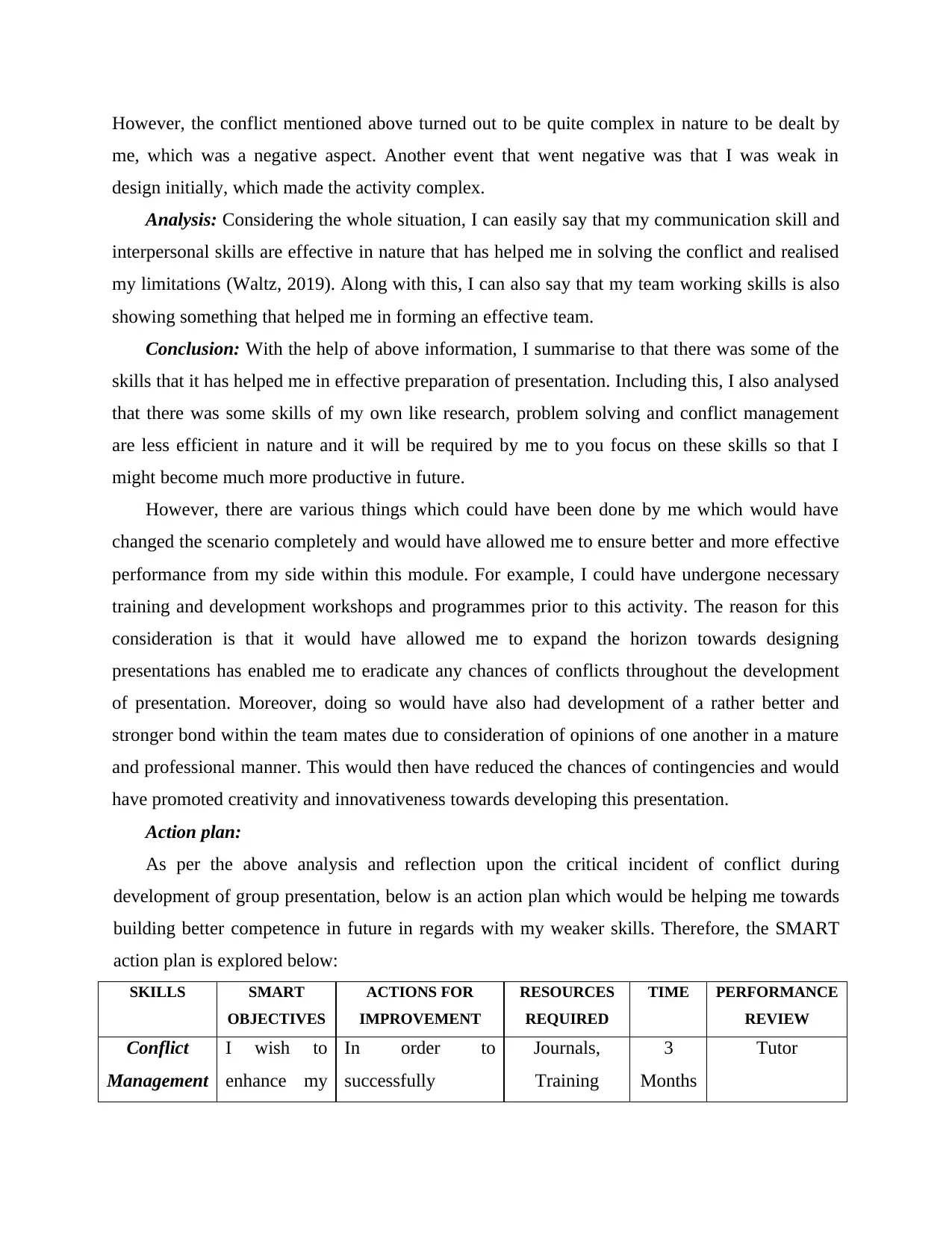
However, the conflict mentioned above turned out to be quite complex in nature to be dealt by
me, which was a negative aspect. Another event that went negative was that I was weak in
design initially, which made the activity complex.
Analysis: Considering the whole situation, I can easily say that my communication skill and
interpersonal skills are effective in nature that has helped me in solving the conflict and realised
my limitations (Waltz, 2019). Along with this, I can also say that my team working skills is also
showing something that helped me in forming an effective team.
Conclusion: With the help of above information, I summarise to that there was some of the
skills that it has helped me in effective preparation of presentation. Including this, I also analysed
that there was some skills of my own like research, problem solving and conflict management
are less efficient in nature and it will be required by me to you focus on these skills so that I
might become much more productive in future.
However, there are various things which could have been done by me which would have
changed the scenario completely and would have allowed me to ensure better and more effective
performance from my side within this module. For example, I could have undergone necessary
training and development workshops and programmes prior to this activity. The reason for this
consideration is that it would have allowed me to expand the horizon towards designing
presentations has enabled me to eradicate any chances of conflicts throughout the development
of presentation. Moreover, doing so would have also had development of a rather better and
stronger bond within the team mates due to consideration of opinions of one another in a mature
and professional manner. This would then have reduced the chances of contingencies and would
have promoted creativity and innovativeness towards developing this presentation.
Action plan:
As per the above analysis and reflection upon the critical incident of conflict during
development of group presentation, below is an action plan which would be helping me towards
building better competence in future in regards with my weaker skills. Therefore, the SMART
action plan is explored below:
SKILLS SMART
OBJECTIVES
ACTIONS FOR
IMPROVEMENT
RESOURCES
REQUIRED
TIME PERFORMANCE
REVIEW
Conflict
Management
I wish to
enhance my
In order to
successfully
Journals,
Training
3
Months
Tutor
me, which was a negative aspect. Another event that went negative was that I was weak in
design initially, which made the activity complex.
Analysis: Considering the whole situation, I can easily say that my communication skill and
interpersonal skills are effective in nature that has helped me in solving the conflict and realised
my limitations (Waltz, 2019). Along with this, I can also say that my team working skills is also
showing something that helped me in forming an effective team.
Conclusion: With the help of above information, I summarise to that there was some of the
skills that it has helped me in effective preparation of presentation. Including this, I also analysed
that there was some skills of my own like research, problem solving and conflict management
are less efficient in nature and it will be required by me to you focus on these skills so that I
might become much more productive in future.
However, there are various things which could have been done by me which would have
changed the scenario completely and would have allowed me to ensure better and more effective
performance from my side within this module. For example, I could have undergone necessary
training and development workshops and programmes prior to this activity. The reason for this
consideration is that it would have allowed me to expand the horizon towards designing
presentations has enabled me to eradicate any chances of conflicts throughout the development
of presentation. Moreover, doing so would have also had development of a rather better and
stronger bond within the team mates due to consideration of opinions of one another in a mature
and professional manner. This would then have reduced the chances of contingencies and would
have promoted creativity and innovativeness towards developing this presentation.
Action plan:
As per the above analysis and reflection upon the critical incident of conflict during
development of group presentation, below is an action plan which would be helping me towards
building better competence in future in regards with my weaker skills. Therefore, the SMART
action plan is explored below:
SKILLS SMART
OBJECTIVES
ACTIONS FOR
IMPROVEMENT
RESOURCES
REQUIRED
TIME PERFORMANCE
REVIEW
Conflict
Management
I wish to
enhance my
In order to
successfully
Journals,
Training
3
Months
Tutor
⊘ This is a preview!⊘
Do you want full access?
Subscribe today to unlock all pages.

Trusted by 1+ million students worldwide
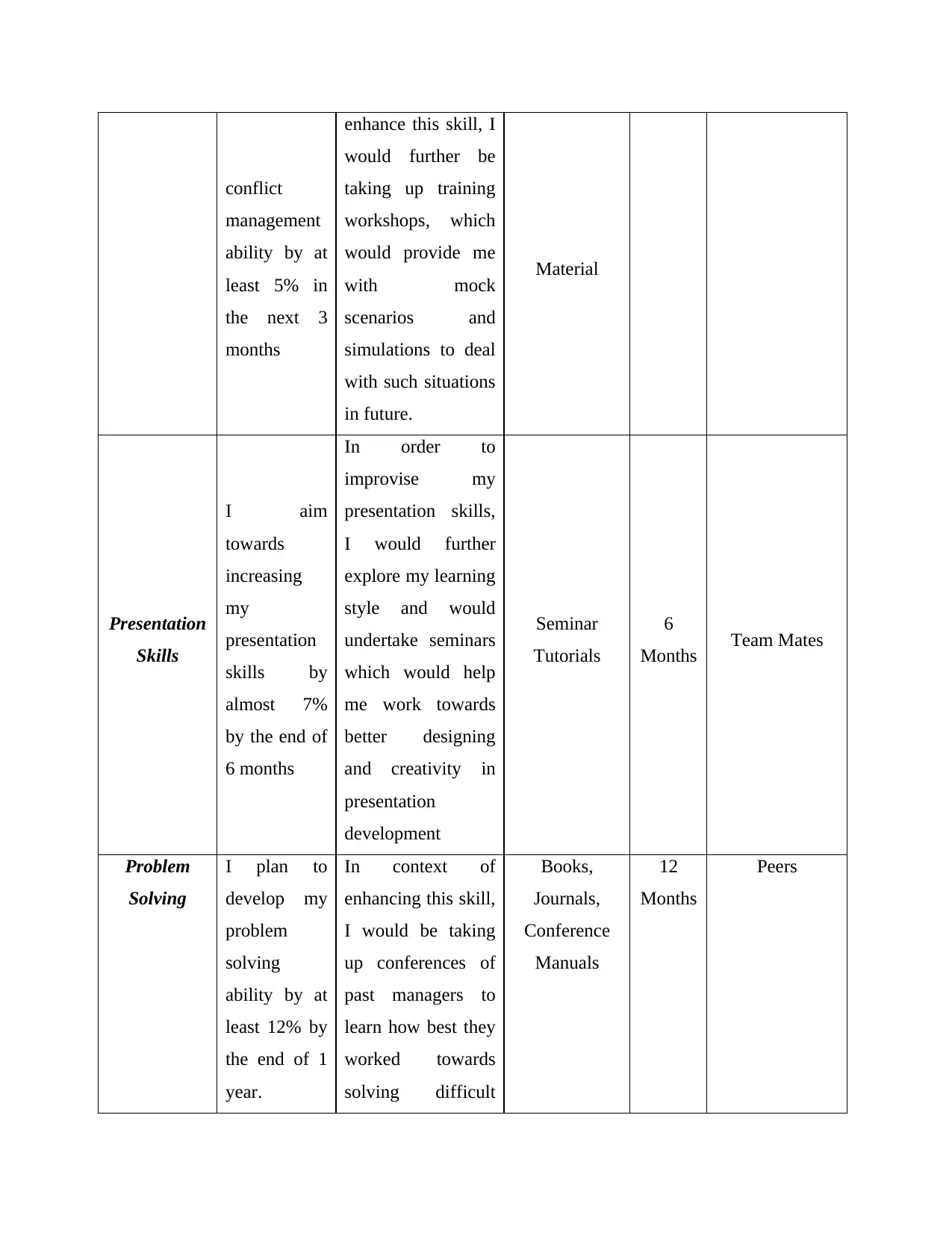
conflict
management
ability by at
least 5% in
the next 3
months
enhance this skill, I
would further be
taking up training
workshops, which
would provide me
with mock
scenarios and
simulations to deal
with such situations
in future.
Material
Presentation
Skills
I aim
towards
increasing
my
presentation
skills by
almost 7%
by the end of
6 months
In order to
improvise my
presentation skills,
I would further
explore my learning
style and would
undertake seminars
which would help
me work towards
better designing
and creativity in
presentation
development
Seminar
Tutorials
6
Months Team Mates
Problem
Solving
I plan to
develop my
problem
solving
ability by at
least 12% by
the end of 1
year.
In context of
enhancing this skill,
I would be taking
up conferences of
past managers to
learn how best they
worked towards
solving difficult
Books,
Journals,
Conference
Manuals
12
Months
Peers
management
ability by at
least 5% in
the next 3
months
enhance this skill, I
would further be
taking up training
workshops, which
would provide me
with mock
scenarios and
simulations to deal
with such situations
in future.
Material
Presentation
Skills
I aim
towards
increasing
my
presentation
skills by
almost 7%
by the end of
6 months
In order to
improvise my
presentation skills,
I would further
explore my learning
style and would
undertake seminars
which would help
me work towards
better designing
and creativity in
presentation
development
Seminar
Tutorials
6
Months Team Mates
Problem
Solving
I plan to
develop my
problem
solving
ability by at
least 12% by
the end of 1
year.
In context of
enhancing this skill,
I would be taking
up conferences of
past managers to
learn how best they
worked towards
solving difficult
Books,
Journals,
Conference
Manuals
12
Months
Peers
Paraphrase This Document
Need a fresh take? Get an instant paraphrase of this document with our AI Paraphraser
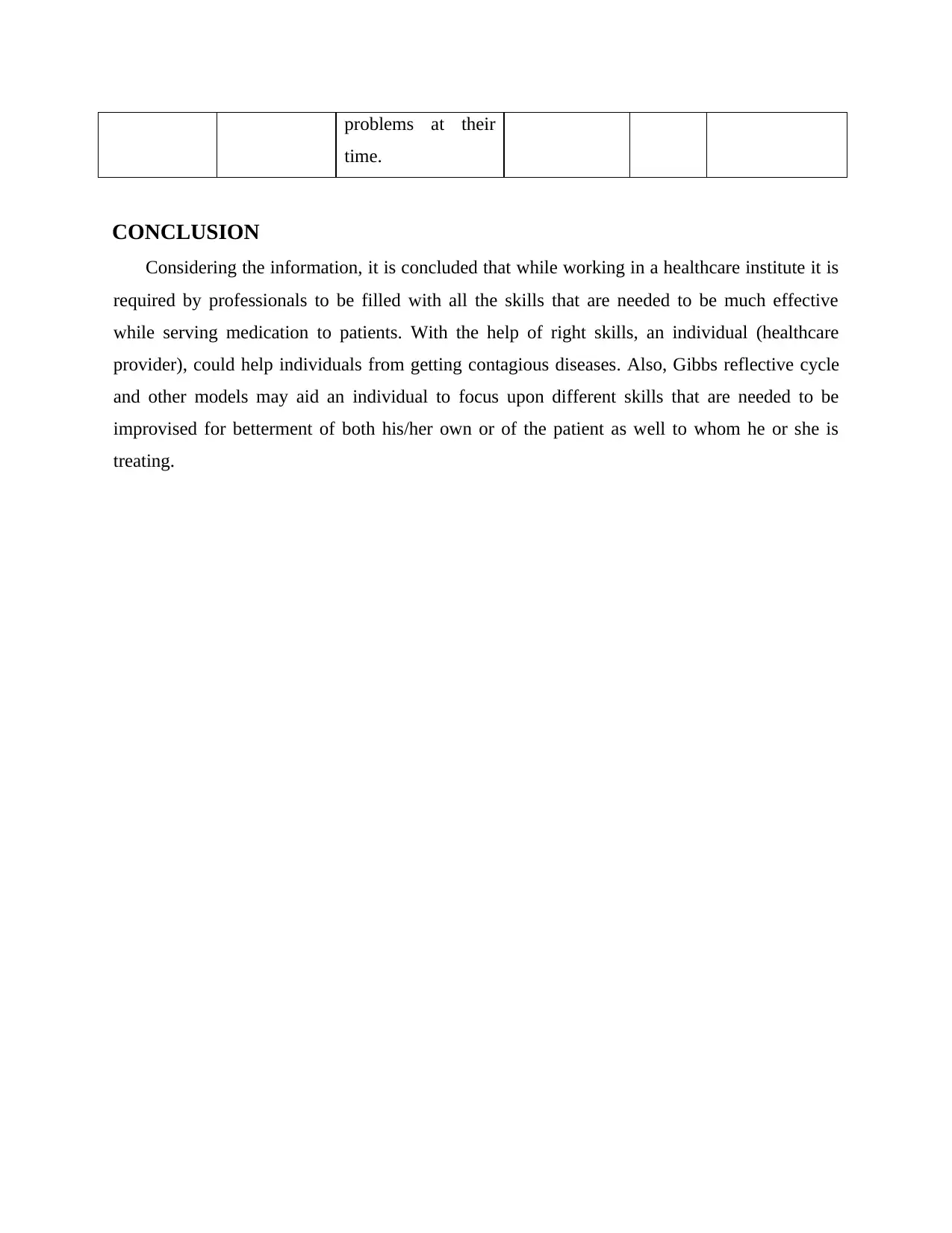
problems at their
time.
CONCLUSION
Considering the information, it is concluded that while working in a healthcare institute it is
required by professionals to be filled with all the skills that are needed to be much effective
while serving medication to patients. With the help of right skills, an individual (healthcare
provider), could help individuals from getting contagious diseases. Also, Gibbs reflective cycle
and other models may aid an individual to focus upon different skills that are needed to be
improvised for betterment of both his/her own or of the patient as well to whom he or she is
treating.
time.
CONCLUSION
Considering the information, it is concluded that while working in a healthcare institute it is
required by professionals to be filled with all the skills that are needed to be much effective
while serving medication to patients. With the help of right skills, an individual (healthcare
provider), could help individuals from getting contagious diseases. Also, Gibbs reflective cycle
and other models may aid an individual to focus upon different skills that are needed to be
improvised for betterment of both his/her own or of the patient as well to whom he or she is
treating.
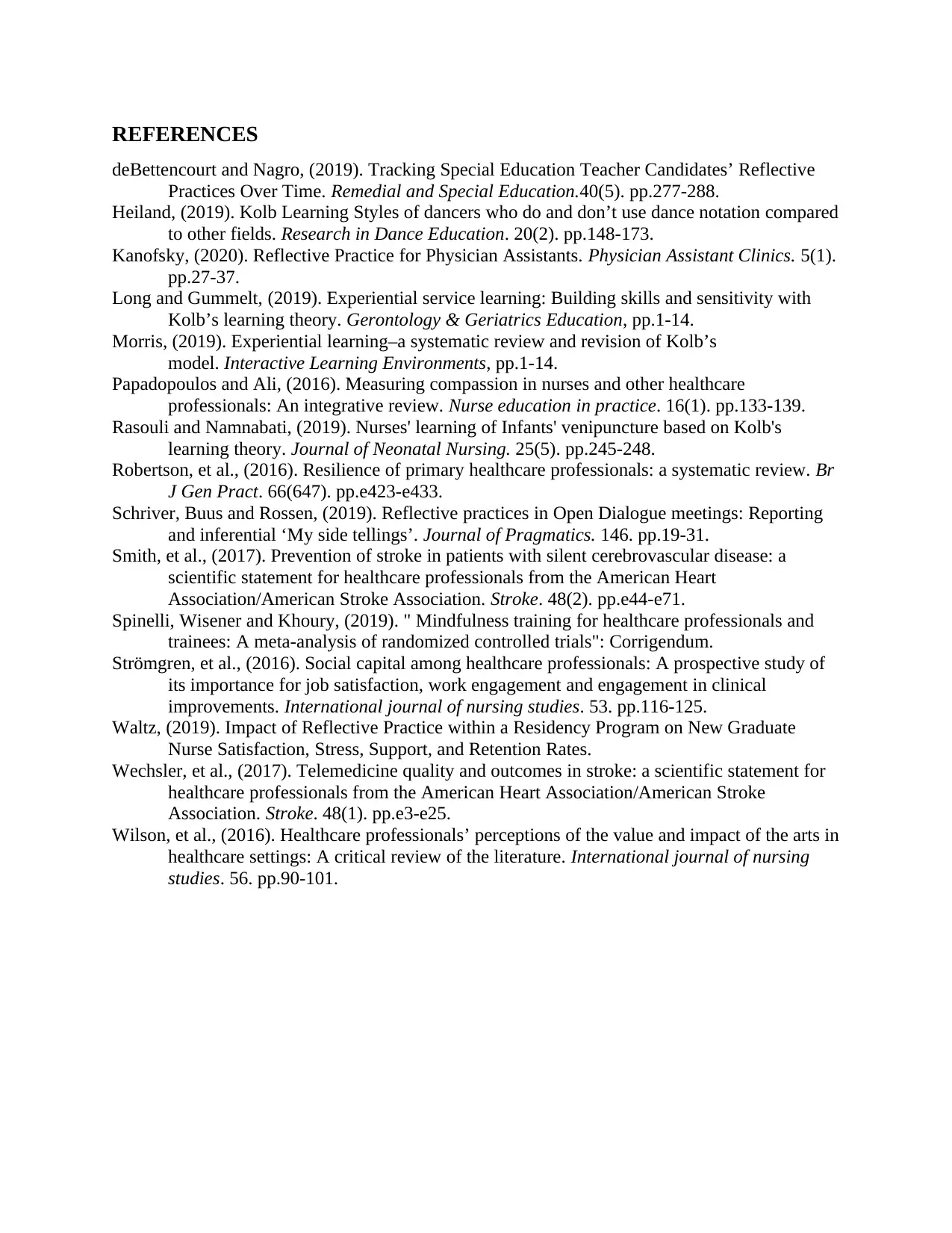
REFERENCES
deBettencourt and Nagro, (2019). Tracking Special Education Teacher Candidates’ Reflective
Practices Over Time. Remedial and Special Education.40(5). pp.277-288.
Heiland, (2019). Kolb Learning Styles of dancers who do and don’t use dance notation compared
to other fields. Research in Dance Education. 20(2). pp.148-173.
Kanofsky, (2020). Reflective Practice for Physician Assistants. Physician Assistant Clinics. 5(1).
pp.27-37.
Long and Gummelt, (2019). Experiential service learning: Building skills and sensitivity with
Kolb’s learning theory. Gerontology & Geriatrics Education, pp.1-14.
Morris, (2019). Experiential learning–a systematic review and revision of Kolb’s
model. Interactive Learning Environments, pp.1-14.
Papadopoulos and Ali, (2016). Measuring compassion in nurses and other healthcare
professionals: An integrative review. Nurse education in practice. 16(1). pp.133-139.
Rasouli and Namnabati, (2019). Nurses' learning of Infants' venipuncture based on Kolb's
learning theory. Journal of Neonatal Nursing. 25(5). pp.245-248.
Robertson, et al., (2016). Resilience of primary healthcare professionals: a systematic review. Br
J Gen Pract. 66(647). pp.e423-e433.
Schriver, Buus and Rossen, (2019). Reflective practices in Open Dialogue meetings: Reporting
and inferential ‘My side tellings’. Journal of Pragmatics. 146. pp.19-31.
Smith, et al., (2017). Prevention of stroke in patients with silent cerebrovascular disease: a
scientific statement for healthcare professionals from the American Heart
Association/American Stroke Association. Stroke. 48(2). pp.e44-e71.
Spinelli, Wisener and Khoury, (2019). " Mindfulness training for healthcare professionals and
trainees: A meta-analysis of randomized controlled trials": Corrigendum.
Strömgren, et al., (2016). Social capital among healthcare professionals: A prospective study of
its importance for job satisfaction, work engagement and engagement in clinical
improvements. International journal of nursing studies. 53. pp.116-125.
Waltz, (2019). Impact of Reflective Practice within a Residency Program on New Graduate
Nurse Satisfaction, Stress, Support, and Retention Rates.
Wechsler, et al., (2017). Telemedicine quality and outcomes in stroke: a scientific statement for
healthcare professionals from the American Heart Association/American Stroke
Association. Stroke. 48(1). pp.e3-e25.
Wilson, et al., (2016). Healthcare professionals’ perceptions of the value and impact of the arts in
healthcare settings: A critical review of the literature. International journal of nursing
studies. 56. pp.90-101.
deBettencourt and Nagro, (2019). Tracking Special Education Teacher Candidates’ Reflective
Practices Over Time. Remedial and Special Education.40(5). pp.277-288.
Heiland, (2019). Kolb Learning Styles of dancers who do and don’t use dance notation compared
to other fields. Research in Dance Education. 20(2). pp.148-173.
Kanofsky, (2020). Reflective Practice for Physician Assistants. Physician Assistant Clinics. 5(1).
pp.27-37.
Long and Gummelt, (2019). Experiential service learning: Building skills and sensitivity with
Kolb’s learning theory. Gerontology & Geriatrics Education, pp.1-14.
Morris, (2019). Experiential learning–a systematic review and revision of Kolb’s
model. Interactive Learning Environments, pp.1-14.
Papadopoulos and Ali, (2016). Measuring compassion in nurses and other healthcare
professionals: An integrative review. Nurse education in practice. 16(1). pp.133-139.
Rasouli and Namnabati, (2019). Nurses' learning of Infants' venipuncture based on Kolb's
learning theory. Journal of Neonatal Nursing. 25(5). pp.245-248.
Robertson, et al., (2016). Resilience of primary healthcare professionals: a systematic review. Br
J Gen Pract. 66(647). pp.e423-e433.
Schriver, Buus and Rossen, (2019). Reflective practices in Open Dialogue meetings: Reporting
and inferential ‘My side tellings’. Journal of Pragmatics. 146. pp.19-31.
Smith, et al., (2017). Prevention of stroke in patients with silent cerebrovascular disease: a
scientific statement for healthcare professionals from the American Heart
Association/American Stroke Association. Stroke. 48(2). pp.e44-e71.
Spinelli, Wisener and Khoury, (2019). " Mindfulness training for healthcare professionals and
trainees: A meta-analysis of randomized controlled trials": Corrigendum.
Strömgren, et al., (2016). Social capital among healthcare professionals: A prospective study of
its importance for job satisfaction, work engagement and engagement in clinical
improvements. International journal of nursing studies. 53. pp.116-125.
Waltz, (2019). Impact of Reflective Practice within a Residency Program on New Graduate
Nurse Satisfaction, Stress, Support, and Retention Rates.
Wechsler, et al., (2017). Telemedicine quality and outcomes in stroke: a scientific statement for
healthcare professionals from the American Heart Association/American Stroke
Association. Stroke. 48(1). pp.e3-e25.
Wilson, et al., (2016). Healthcare professionals’ perceptions of the value and impact of the arts in
healthcare settings: A critical review of the literature. International journal of nursing
studies. 56. pp.90-101.
⊘ This is a preview!⊘
Do you want full access?
Subscribe today to unlock all pages.

Trusted by 1+ million students worldwide
1 out of 12
Related Documents
Your All-in-One AI-Powered Toolkit for Academic Success.
+13062052269
info@desklib.com
Available 24*7 on WhatsApp / Email
![[object Object]](/_next/static/media/star-bottom.7253800d.svg)
Unlock your academic potential
Copyright © 2020–2026 A2Z Services. All Rights Reserved. Developed and managed by ZUCOL.





